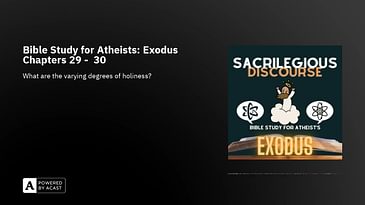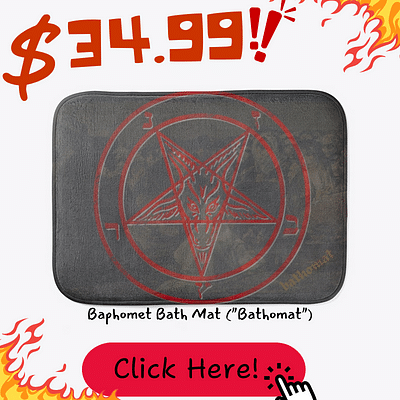The Consecration of Aaron and His Sons / The Daily Offerings
The Alter of Incense / The Atonement Money / The Laver / The Anointing Oil and the Incense.
Are there any living descendants of Aaron still puttering around today? Are they aware they'll die if they don't wash their hands? What are the varying degrees of holiness? How much is a shekel? What exactly is the "usual" method for all these recipes?
Join us on DISCORD: https://discord.gg/8RwwMrb5zK
Skip the ads by joining Acast+ https://plus.acast.com/s/6331d364470c7900137bb57d
Thank you for stopping by Sacrilegious Discourse - Bible Study for Atheists!
Check out these links for more information about our podcast and merchandise:
Our Homepage: https://sacrilegiousdiscourse.com/
Help support us by subscribing on Patreon: https://www.patreon.com/sacrilegiousdiscourse
Exodus 29
This chapter describes the elaborate rituals that the Israelites were commanded to perform in order to consecrate their priests and make them holy. The rituals involved sacrificing animals, anointing the priests with oil, and dressing them in special garments.From an atheist perspective, these rituals are meaningless. There is no evidence that they have any power to make the priests holy or to connect them with God. The rituals are simply a way for the Israelites to express their devotion to their religion.
Exodus 30
This chapter describes the construction of the altar of incense and the laver for washing. The altar of incense was to be used for burning incense, which was believed to be a pleasing scent to God. The laver was to be used for washing the priests' hands and feet before they performed the rituals.From an atheist perspective, these objects are also meaningless. There is no evidence that incense is pleasing to God or that washing the priests' hands and feet has any religious significance. These objects are simply a way for the Israelites to express their devotion to their religion.In addition to the rituals and objects described in these chapters, Exodus also contains many other passages that describe the Israelites' religious practices. These passages are all based on the belief that there is a God who intervenes in human affairs and who requires the Israelites to follow a set of rules and regulations.Atheists do not believe in God, so they do not believe that these rituals and objects have any religious significance. They believe that the Israelites developed these practices as a way to express their devotion to their religion and to create a sense of community.The rituals and objects described in Exodus chapters 29 and 30 are just a few examples of the many religious practices that are described in the Bible. Atheists do not believe in the religious significance of these practices, but they can still appreciate their cultural and historical value.






